
Lone Worker Security Solutions to Protect Your Staff
Why Demand for Lone Worker Security Is Rising
Lone worker security is essential for protecting staff exposed to safety risks, including accidents, injuries, and even violent attacks. With no immediate backup or support, worker security can be compromised and employees put at a higher risk of serious harm or injury. Therefore, it’s essential to prioritize lone worker security so they can remain safe in the workplace.
By prioritizing lone worker security, companies not only ensure staff safety but also demonstrates the company’s commitment to their employees’ well-being. This has a knock-on effect of creating a safer work environment, a positive safety culture, and boosts employee morale and productivity. It also reduces the risk of costly lawsuits, damages, and lost productivity due to workplace accidents and injuries.
The growing need for lone worker security
One company researching lone worker security is Berg Insight, the IoT analyst firm. They have been researching the subject of worker security and the security solutions they use since 2015. In each report, the number of lone workers, number of solutions available and the value of the market has steadily grown.
In 2017 Berg Insight stated the number of users of dedicated work alone security devices based on GPS and cellular technology on the European market was estimated to grow from 500,000 users in 2017 to reach 1.1 million users at the end of 2022. They predicted in North America, the number of such users would grow from 155,000 in 2017, to reach 375,000 at the end of 2022.
Were the predictions from Berg Insight about worker security correct?
Berg Insight’s report from August of this year shows how close their predictions were. Their findings show that the estimated user base of lone worker security solutions in Europe and North America had grown from 655,000 and was already 1.1 million at the end of 2020! The industry has grown so extensively that it is well on its way to the predicted total of 1.4 million by the end of 2022.
This year’s report has given new predictions for 2025. Berg Insight predicts that for Europe and North America, the market value for lone worker security solutions and services is anticipated to grow to € 190 million by the end of 2025 and that there could be as many as 1.8 million users.
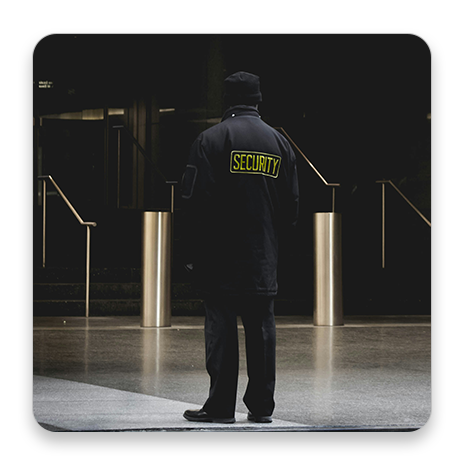
Key Reasons to Invest in Lone Worker Security
The market drivers for lone worker security solutions include stricter occupational safety regulations, increasing employee insurance costs and higher awareness of risks associated with lone working. A newer factor also becoming more prevalent is a greater focus by companies on protecting their brand reputation. Legislation specifically addressing the safety of lone workers has fostered growth in the U.K and Canadian markets. These drivers highlight the growing need for reliable lone worker security systems that align with legal and ethical standards.
Regional differences
As a result of this, the UK market is the largest and most mature lone worker market in Europe and North America, followed by the Canadian market.
In Europe, app-based worker security solutions are estimated to account for around 25 per cent of all solutions, while in North America more than 40 per cent of staff safety and security solutions are based on apps for smartphones and tablets. In both regions, app-based security for lone workers is forecasted to account for an increasing share of lone worker service providers in the coming years.
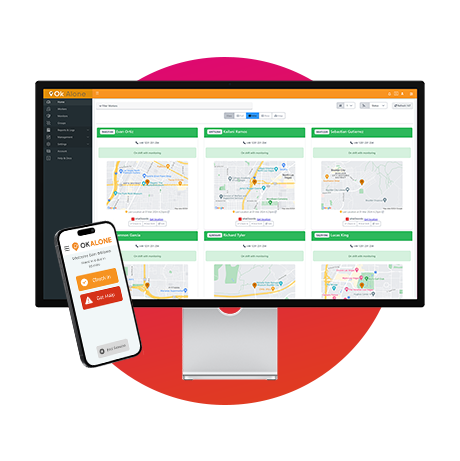
Who can benefit from worker security apps?
“Traditionally, lone workers exposed to the highest social or environmental risks have been found in industries such as security services, social care, field services and in heavy industries such as oil & gas and construction” says Martin Bäckman, IoT Analyst at Berg Insight.
He adds that companies in other industries are now also starting to see the benefits of these services. “There is now an increasing demand for lone worker security services from workers in retail, financial services, education and more, which fuels market growth”, concludes Mr. Bäckman.
When asked about his thoughts on the future of the dedicated lone worker security device, Bäckman stated, “The greatest opportunities for lone worker safety solution vendors going forward are in the private sector”.
The sheer number of workers in the private sector is vastly larger than in the public sector and companies and organizations in the private sector are typically not as restricted in terms of budgets. Selling to private sector organizations requires a different set of capabilities and competencies which vendors need to be aware of and adapt to. “Smaller companies and start-ups that are not weighed down by legacy organizational structures and practices might have an edge over incumbents if the market dynamics changes.” Mr. Bäckman replied.
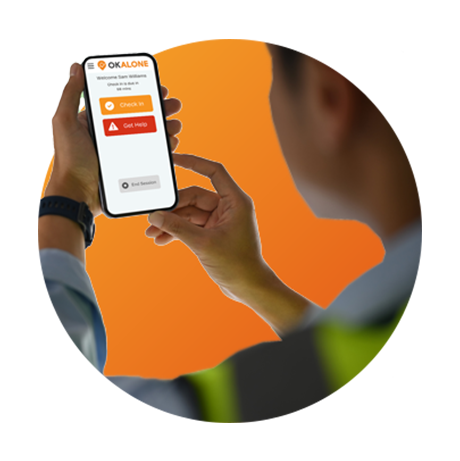
How can you enhance your security for Lone Workers?
The number of people working alone in hazardous and exposed environments keeps increasing. Companies that have lone workers must implement a multi-faceted staff safety and security program consistent with their local duty of care standards. Workers who work alone or are in a remote location for periods of time need to have access to a panic button, or other methods of communication, especially if there is a risk of violence. Using lone worker security systems allows security officers, or whoever is monitoring staff, to have an exact location if the worker should need emergency services.
Industries that benefit from lone worker security systems
As mentioned above, lone worker security systems are becoming more crucial to a wider range of industries. At OK Alone for example, our worker security app is adopted as a safety feature for:
And many more.
These devices and apps allow people working outside of normal business hours or in potentially dangerous situations, to have complete belief that worker security and safety is being taken seriously.
Features of Lone Worker Safety Solutions
Apps like our lone worker app provide a multitude of benefits for both employees and employers. With finessed safety protocols, in-depth reporting and easy integration, it delivers a versatile, easy to use lone worker security solution.

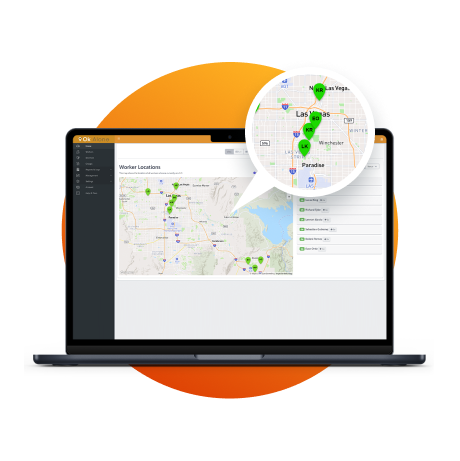
Protect Your Lone Workers with a 24/7 Alarm System
Ensure the safety and well-being of your lone workers with advanced alarm systems offering 24/7 monitoring, GPS tracking, and emergency alerts. From panic buttons to voice-activated features, these solutions provide instant support, meeting legal requirements and giving workers peace of mind. Explore affordable, customizable options like Ok Alone for unmatched safety.
Lone Worker Alarm
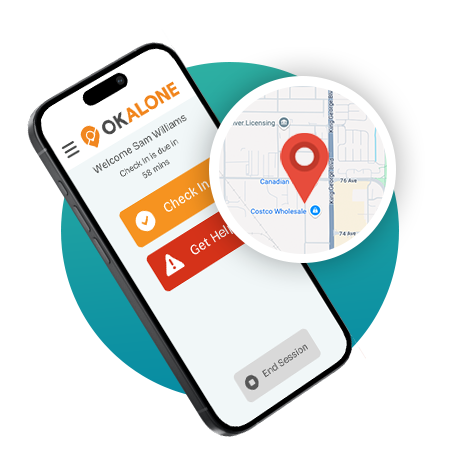
Enhance Lone Worker Safety with GPS Monitoring
Knowing a worker’s location in a dangerous situation is vital. Our location monitoring is transparent and protects the worker’s privacy whilst providing the protection they need in case of an emergency alarm. With options like GPS High for precision and GPS Normal for battery efficiency, this app runs seamlessly in the background, giving employers peace of mind and workers reliable protection anytime, anywhere.
Lone Worker Monitoring
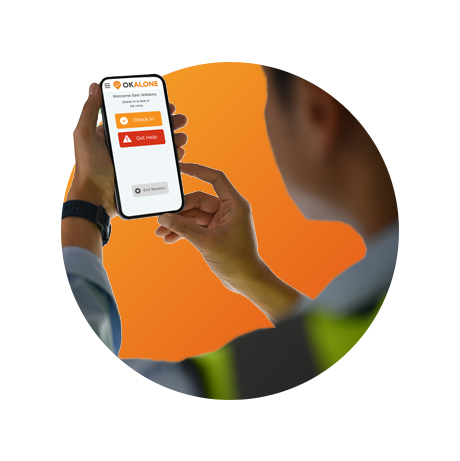
Ensure Lone Worker Safety With Timed check-ins
To ensure supervisors or designated team members are always aware of staff safety and security, lone worker security systems, such as our app, enable timed check-ins. This means that the lone, or remote workers can send a notification to their supervisor or other team members that all is well and they are safe.
Lone Worker Check-in
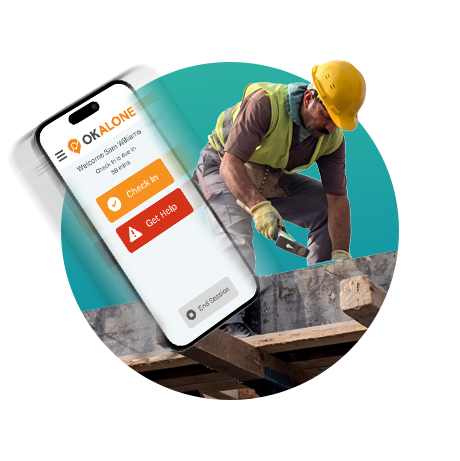
Respond quickly to falls with the Man Down App
Many apps like these feature man down alarms. Should a lone worker have a fall from height or a lack of movement be detected, the worker security app can send an alert to the alarm receiving centre and set the wheels in motion for a speedy resolution.
Man Down App
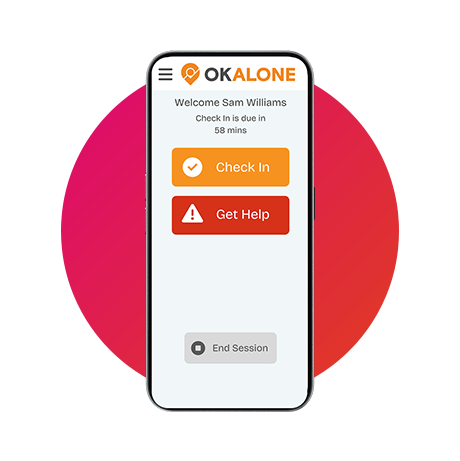
Quick Assistance with the Ok Alone Panic Button
Stay protected with the Ok Alone app’s easy-to-use Panic Button. Tap the app’s bold “Help” button or use voice commands to send immediate alerts. Whether at work or off-shift, supervisors receive real-time GPS updates, ensuring fast assistance whenever you need it. Peace of mind is just one tap away.
Lone Worker Panic ButtonHere at Ok Alone we have a lone worker security solution suitable for a wide range of companies with employees that need protecting. Enhance your employee security with our top-rated lone worker security solution. Book a demo or get a quote today and ensure your worker security is at its highest possible standard.
Book a Demo Today
Alternatively, get a free trial of the app
Want to try OK Alone? Click the button below and enter your details. It's free and no credit card is required.
